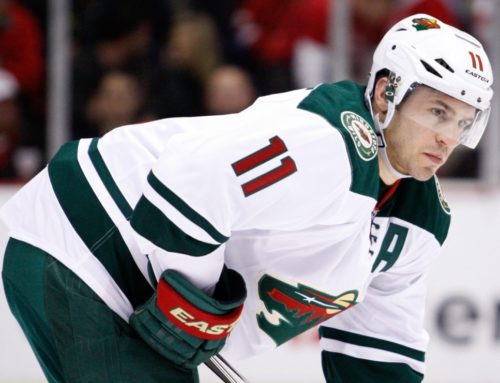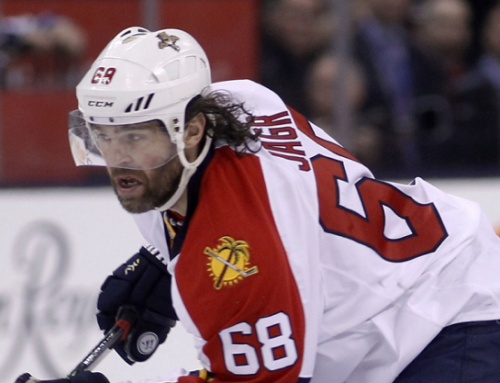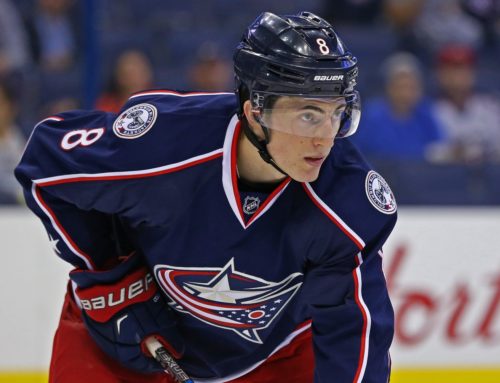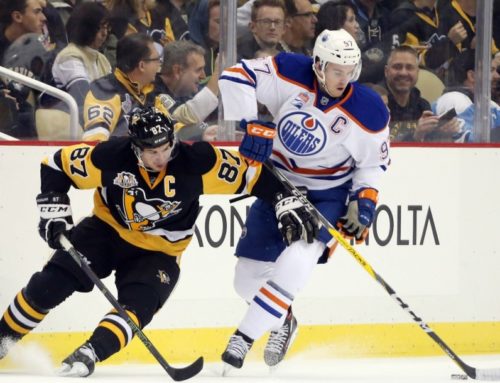
What are NHL GMs thinking when they make the deals that they make?
This week was quite busy. Leading up to the NHL Entry Draft were all the rumors and discussion about who would be going where and how much or little GMs were going to get in return for those players.
Then on Friday we got a few deals to kick start everything. People were getting giddy that all their troubles would be traded away. As the draft proceeded, it turned out that most of the rumors fizzled out, as they normally do. The draft went on.
Now that it is all over, there was one more move that caught everyone slightly off guard. I will peek into that deal first, then two more after that.
Deal #1
Sam Gagner and a conditional fourth (in 2016) or third (in 2017) round pick in exchange for Nicklas Grossmann and Chris Pronger. This deal is about knowing the rules and squeezing the most juice from a lemon.
Arizona's Don Maloney and Philadelphia's Ron Hextall were two GMs with opposite needs, and they were creative enough to figure out how to help each other.
The salary cap hit of Pronger's contract was more than nine times the value of the real amount of money needing to pay him each of the next two seasons.
The Flyers may or may not buy out Gagner's contract. But if they do, it will cost them less than 1.5 million over the next two seasons in real dollars. That is because Gagner is 25 years old and his contract can be bought out at one-third. (Note that Tampa Bay is paying for one-third of the contract as part of how he got to be on the Coyotes.) A potential buyout is all explained nicely by Mark Spector.
You can argue about Pronger's status or how this isn't a hockey deal, but kudos should go to both teams for understanding how the system can be played.
This isn't a new thing either. The Clarkson-Horton deal a few months ago comes to mind, and I think the Islanders did something similar a few years back with Tim Thomas.
I bet those lemon drop martinis made from those sour lemons taste pretty good right now.
Deal #2
Robin Lehner and David Legwand for the 21st pick (Colin White). This deal is about ties and connections.
Tim Murray is the GM of the Buffalo Sabres. He was hired back in January of 2014, but before that, he spent seven years as an assistant GM in Ottawa to his uncle Bryan Murray.
So when Tim was looking for a goalie, he went and got a goalie he knew well from a person he had a connection with. Voila! It was as simple as that.
Tim was ecstatic, "If you'd have told me we'd end up with (Jack) Eichel), (Evander) Kane and (Robin) Lehner for three first-round picks, I'd have said you were high on mushrooms," as quoted by Michael Traikos of The Sun Times.
Well, Bryan makes it sound like that in this article by Mike Zeisberger of the Toronto Sun. "(Tim) knows as much about Robin ad anybody does. That's why he was willing to give me the first round pick. Up to that point in time, the best I could do was a second round pick and that wasn't, to me, acceptable for a guy this caliber."
In all buddy-buddy deals there is a catch, and in this case it was taking Legwand's final year at three million off of Ottawa's books. Just one year ago it was a big deal to add stability to the Senators' roster.
Now they were packaging him away with one of their extra goalies. It was probably the reason why other teams were only willing to offer a second-round draft pick to Bryan.
Thanks to nephew Tim, everything worked out.
I'm not saying this is bad. It is part of fantasy hockey. Heck, it is part of life.
Know your owners and stay connected. You never know when one of them can help you. You never know when you can help them.
Deal #3
Dougie Hamiton for the 15th (Zachary Senyshyn), 45th (Jakob Forsbacka Karlsson) and 52nd (Jeremy Lauzon) picks. Call this the big mouth deal.
It starts with Peter Chiarelli. He was GM of the Bruins back when he made the Phil Kessel trade, and as part of the return, he got a draft pick that became Hamilton.
Like Tim Murray being familiar with Lehner, Chiarelli knew Hamilton very well. So when he was asked earlier in the week about using an offer sheet to a pending RFA player (like Hamilton) he said that "it's a tool in our tool box," and "it's something that you can use and certainly I wouldn't rule out using it," as per TSN.
That must have sent shivers down new Boston Bruins GM Don Sweeney. Many are not sure why.
Travis Yost explains what would be the compensation for a restricted free agent that was signed to an offer sheet. Scott Cullen adds (via GeneralFanager.com) how the formula for calculating compensation is done when a contract is for more than five years.
In Cullen's hypothesis, if the compensation for Hamilton's offer sheet was between $5.5 and $7.3 million, then the Bruins would get back a first, second, and third-round draft pick as compensation.
An offer sheet worth between $7.3 and $9.1 million would give them two first-round, a second-round and a third-round pick.
More than 9.1 million would translate to four first-round picks.
What we do know is that Sweeney settled for a first and two second-round picks in this draft. This is slightly better than the compensation for a contract in the $5.5 to $7.3 million range. Unless he felt that this draft was so deep and strong, why make the deal right now. Let it play out and see if he could keep Hamilton.
Other GMs will do anything to protect and keep their younger players especially the ones that have skills analysts say are exceptional. As Ronnie Shuker of THN.com notes, the Bruins let them slip through their fingers.
You can breakdown each of the Bruins draft picks and analyze why they were taken when they were, or if Sweeney had other deals that would have converted some of the other picks into a better-ranked prospect like Noah Hanifin, but it won't matter.
The Bruins look like losers right now and only time will tell if they look like losers years later. They panicked and everyone knows it.
There is another loser in this case too. No one has identified him, but it is Chiarelli. Why is he a loser?
Because he opened up his mouth and let it be known implicitly that he was going to take his former employers for a ride.
Not only did he not get Hamilton, but he let his provincial and divisional rivals, the Calgary Flames, one-up his Oilers.
For all the years Brian Burke wore the goat horns about the Kessel deal, he now has the last laugh with Doug Hamilton.
Sometimes people are so intoxicated with their own self. You should be careful too.
You don't want other owners to think that they got the better of you because you were drunk out of your own mind.





 CHI
CHI BUF
BUF NYR
NYR TOR
TOR ANA
ANA PIT
PIT N.J
N.J L.A
L.A DET
DET CAR
CAR
